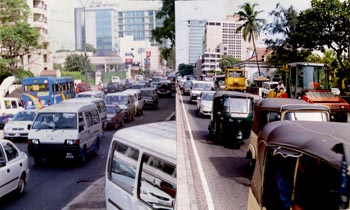|
observer |
|
|
|
|
|
OTHER LINKS |

|

|

|
Overloading vehicles a drain on economyExcessive loading of vehicles with the resultant deterioration of road surface in almost every developing country is the primary reason for higher cost of transport. Since airline costs and shipping services are becoming increasingly more competitive, roads have to compete to ensure that local economies do not to lose long haulages by air or ship, said Prof. Amal S. Kumarage.
He was addressing an international workshop on "Assessing the need for management of highway axle loads in developing countries" in Colombo recently. He said that air freight on some routes is as low as US$ 10 cents per ton Km, whereas road haulage often costs more than that. The ever changing vehicle technology produces bigger and faster vehicles annually. Ill-formulated tax regimes on fuel and vehicle imports often encourage the use of larger vehicles even though roads and road related infrastructure such as bridges have not been designed for such, Prof. Kumarage said. Only around 5% of the national roads in Sri Lanka are in good condition and well maintained, while over 50% of its length is beyond routine maintenance and needs expensive rehabilitation. These poor quality roads and associated high transport costs reduce the competitiveness of trade and goods in distant markets and thereby reduce the potential for economic growth, he said. This year the Government invested Rs. 60 billion on the road sector and it is in line with the targeted growth rate of 8%. However, studies have shown that congestion, time losses and accidents are costing the country Rs. 40-50 billion annually. The entire transport sector loss is around 4% of GDP and this margin alone can make entire sectors such as garments, industrial goods, agricultural products or handicrafts, in Sri Lanka become non-competitive in major markets, he said. Several research papers were presented by the University of Moratuwa and the Road Development Authority (RDA) at the workshop. The Axle Load Survey conducted by the RDA showed that 43% of two axle trucks and 57% of multi axel trucks are being overloaded. The amount of overloading appears to be as high as 49% measured by (axle weight ratio) ESA per vehicle. The survey conducted on the A6 highway revealed that 100% of vehicles transport soil or clay, fertiliser, grain, poultry food, fish and timber that are overloaded. Similarly, 96% cement, 99% flour, 91% metal, 83% petroleum transporting vehicles are overloaded. Survey data since 1992 shows an increasing trend in overloading. This deteriorates roads faster and increases the cost of maintenance. To curb this trend, it stressed the need to enforce provisions in the legal enactments and strengthen the laws. The paper pointed out that the present legislation in Sri Lanka pertaining to vehicle weights and dimension are not based on an acceptable study. Load levels enforced today have not been computed after research or study. The present cost recovery method from road haulage vehicles is also inconsistent and does not recover the actual costs. The survey showed that overloading is significant and frequent. However, the general attitude of state agencies on recovery of actual road user costs and desire to enforce limitation on vehicle weight has been very poor, the paper pointed out. Six countries in the region presented working papers at this workshop jointly organised by UNI Consultancy Services and the University of Moratuwa. It was sponsored by SIDA. |







